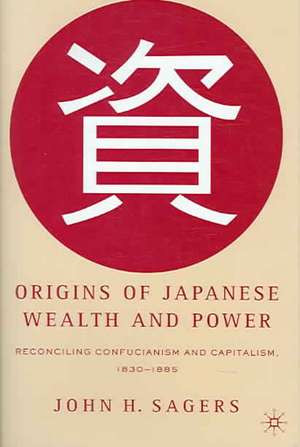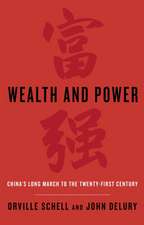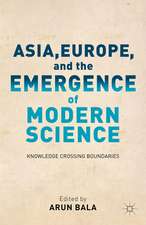Origins of Japanese Wealth and Power: Reconciling Confucianism and Capitalism, 1830–1885
Autor J. Sagersen Limba Engleză Hardback – 22 feb 2006
| Toate formatele și edițiile | Preț | Express |
|---|---|---|
| Paperback (1) | 380.25 lei 6-8 săpt. | |
| Palgrave Macmillan US – 22 feb 2006 | 380.25 lei 6-8 săpt. | |
| Hardback (1) | 384.31 lei 6-8 săpt. | |
| Palgrave Macmillan US – 22 feb 2006 | 384.31 lei 6-8 săpt. |
Preț: 384.31 lei
Nou
Puncte Express: 576
Preț estimativ în valută:
73.54€ • 78.64$ • 61.31£
73.54€ • 78.64$ • 61.31£
Carte tipărită la comandă
Livrare economică 17 aprilie-01 mai
Preluare comenzi: 021 569.72.76
Specificații
ISBN-13: 9781403971111
ISBN-10: 1403971110
Pagini: 208
Ilustrații: XIII, 175 p.
Dimensiuni: 140 x 216 x 16 mm
Greutate: 0.33 kg
Ediția:2006
Editura: Palgrave Macmillan US
Colecția Palgrave Macmillan
Locul publicării:New York, United States
ISBN-10: 1403971110
Pagini: 208
Ilustrații: XIII, 175 p.
Dimensiuni: 140 x 216 x 16 mm
Greutate: 0.33 kg
Ediția:2006
Editura: Palgrave Macmillan US
Colecția Palgrave Macmillan
Locul publicării:New York, United States
Cuprins
Economic Realism and Confucian Statecraft The Rise of Mercantilism in Satsuma Lord Shimazu Narikira and Satsuma Reforms Confronting International Capitalism Okubo Toshimichi and Early Meiji Industrial Policy Industrial Promotion on a Tight Budget in the Early 1880s
Recenzii
"Up to now, historians have asked about the origins of Japan's distinctive state-led economic system. John Sagers turns the question around and in a lucid, thought-provoking account asks how it was that samurai bureaucrats from the most feudalistic and command-oriented of regions, Satsuma, built a market-oriented economy. A great read!" - Mark Metzler, University of Texas at Austin, author of Lever of Empire: The International Gold Standard and the Crisis of Liberalism in Prewar Japan
"Sagers' study is particularly interesting in that it explores political economic thought across the divide of the Meiji Restoration. He closely examines Satsuma domain and its pragmatic officials who later served in the Meiji government to highlight the continuities of political economic reasoning within early modern domainal states and the modern Japanese state." - Luke Roberts, University of California, Santa Barbara
"The first book-length study in English of official economic concepts and practices across the Meiji Restoration of 1868, this work makes a signal contribution to our understanding of Japan's transition to a modern capitalist economy. By documenting the indigenous sources of Meiji economic thinking, the author offers an important corrective to the standard view that after 1868 Japanese leaders drew inspiration almost exclusively from Western economic ideas and models. A welcome addition to the new wave of studies dealing with Japan's experience in the nineteenth century as a whole." - Steven Ericson, Dartmouth College
"[A] useful exploration of the development strategies pursued by nineteenth-century Satsuma and the early Meiji state." - Tom Havens, Northeastern University
"Sagers' study is particularly interesting in that it explores political economic thought across the divide of the Meiji Restoration. He closely examines Satsuma domain and its pragmatic officials who later served in the Meiji government to highlight the continuities of political economic reasoning within early modern domainal states and the modern Japanese state." - Luke Roberts, University of California, Santa Barbara
"The first book-length study in English of official economic concepts and practices across the Meiji Restoration of 1868, this work makes a signal contribution to our understanding of Japan's transition to a modern capitalist economy. By documenting the indigenous sources of Meiji economic thinking, the author offers an important corrective to the standard view that after 1868 Japanese leaders drew inspiration almost exclusively from Western economic ideas and models. A welcome addition to the new wave of studies dealing with Japan's experience in the nineteenth century as a whole." - Steven Ericson, Dartmouth College
"[A] useful exploration of the development strategies pursued by nineteenth-century Satsuma and the early Meiji state." - Tom Havens, Northeastern University
Notă biografică
JOHN SAGERS is Assistant Professor of History at Linfield College, USA.














